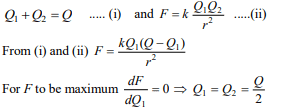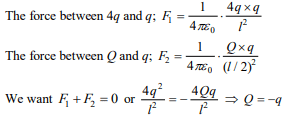1. The minimum charge on an object is
a) 1 coulomb
b) 1 stat coulomb
c) \[ 1.6\times 10 ^{-19} coulomb \]
d) \[ 3.2\times 10 ^{-19} coulomb \]
Explanation: All other charges are its integral multiple
2. Out of gravitational, electromagnetic, Vander
Waals, electrostatic and nuclear forces; which
two are able to provide an attractive force
between two neutrons
a) Electrostatic and gravitational
b) Electrostatic and nuclear
c) Gravitational and nuclear
d) Some other forces like Vander Waals
Explanation: Gravitational force and nuclear force both are attractive in nature
3. A total charge Q is broken in two parts \[Q_{1}\] and \[Q_{2}\]
and they are placed at a distance R from each other. The maximum force of repulsion between
them will occur, when
a) \[Q_{2} =\frac{Q}{R},Q_{1} =Q-\frac{Q}{R}\]
b) \[Q_{2} =\frac{Q}{4},Q_{1} =Q-\frac{2Q}{3}\]
c) \[Q_{2} =\frac{Q}{4},Q_{1} =\frac{3Q}{4}\]
d) \[Q_{1} =\frac{Q}{2},Q_{2} =\frac{Q}{2}\]
Explanation:

4. Three charges 4q, Q and q are in a straight line in
the position of O, l/2 and l respectively. The
resultant force on q will be zero, if Q =
a) – q
b) –2 q
c) \[-\frac{q}{2}\]
d) 4 q
Explanation:

5. An isolated solid metallic sphere is given +Q
charge. The charge will be distributed on the
sphere
a) Uniformly but only on surface
b) Only on surface but non-uniformly
c) Uniformly inside the volume
d) Non-uniformly inside the volume
Explanation: The charge given to a sphere will be distributed uniformly over the surface.
6. Two small spheres each having the charge +Q are
suspended by insulating threads of length L from
a hook. This arrangement is taken in space where
there is no gravitational effect, then the angle
between the two suspensions and the tension in
each will be
a) \[180^{\circ},\frac{1}{4\pi\epsilon_{0}}\frac{Q^{2}}{\left(2L\right)^{2}}\]
b) \[90^{\circ},\frac{1}{4\pi\epsilon_{0}}\frac{Q^{2}}{L^{2}}\]
c) \[180^{\circ},\frac{1}{4\pi\epsilon_{0}}\frac{Q^{2}}{2L^{2}}\]
d) \[180^{\circ},\frac{1}{4\pi\epsilon_{0}}\frac{Q^{2}}{L^{2}}\]
Explanation:

7. Two charges each of 1 coulomb are at a distance
1km apart, the force between them is
a) \[9\times 10^{3}Newton\]
b) \[9\times 10^{-3}Newton\]
c) \[1.1\times 10^{-4}Newton\]
d) \[ 10^{4}Newton\]
Explanation:

8. +2C and +6C two charges are repelling each
other with a force of 12 N . If each charge is given -2C of charge, then the value of the force will be
a) 4N (Attractive)
b) 4N (Repulsive)
c) 8N (Repulsive)
d) Zero
Explanation:

9.Dielectric constant of pure water is 81. Its
permittivity will be
a) \[7.12\times 10^{-10}\] MKS units
b) \[8.86\times 10^{-12}\] MKS units
c) \[1.02\times 10^{13}\] MKS units
d) Cannot be calculated
Explanation:

10. There are two metallic spheres of same radii but
one is solid and the other is hollow, then
a) Solid sphere can be given more charge
b) Hollow sphere can be given more charge
c) They can be charged equally (maximum)
d) None of the above
Explanation: Because in case of metallic sphere either solid or hollow, the charge will reside on the surface of the sphere. Since both spheres have same surface area, so they can hold equal maximum charge